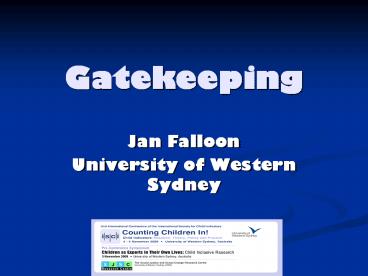Gatekeeping - PowerPoint PPT Presentation
Title:
Gatekeeping
Description:
Gatekeeping Jan Falloon University of Western Sydney A Challenge of child centred research Negotiating and engaging with large numbers of gatekeepers Who? – PowerPoint PPT presentation
Number of Views:41
Avg rating:3.0/5.0
Title: Gatekeeping
1
Gatekeeping
- Jan Falloon
- University of Western Sydney
2
A Challenge of child centred research
- Negotiating and engaging with large
- numbers of gatekeepers
3
Who?
- Parents other carers
- Agencies
- Caseworkers
- Ethics committees
- Researchers
- Children and young people
4
Attributes of the gated
- Barzilai-Nahon (2008) identifies four attributes
of the 'gated' - political power (their ability to set agendas or
change their preferences), - information production
- relationship with the gatekeeper
- and alternatives.
5
Political power
- Conscious, unconscious or positively supporting
the status quo - Positioning of children
- Control of information, policy practice
- and decision making
- Those within the welfare system are in double
jeopardy
6
Relationship with gatekeepers
- gating of the gatekeepers
- Relationship with gatekeeper
7
Ownership of information production
- Negotiated through adults
- Child-centred research included in but often
not controlled by children - Children as researchers ?
8
Alternatives
- Childrens parliaments other information
sharing or knowledge production fora - Children as researchers?
9
Why gatekeep?
- POWER
- Unequal power relationships
- Positioning of children young people
- Dichotomy - us and them
10
PROTECTION
- VULNERABILITY
- Protection because of childrens perceived
vulnerability - Particularly relevant in the child welfare sector
where the state frequently has stepped in to
protect children as the ultimate authority - Protection from having their views heard-gt
further silencing
11
- (IN)COMPETENCE
- Protection because of childrens perceived
Incompetence - Age related
- Protection of agencies/workers/parents
- competence
- Our competence as researchers?
12
Best Interests
- Determined by whom?
- Concept underpins much child welfare work
- Many of us make our living from children
13
Context/Functions
- Time constraints in busy schedules
- Competing priorities parents children agencies
- Systemic practice eg ethics committees
14
How do we overcome these challenges?
- Broadly
- Advocating for the recognition of childrens
agency - Education around childrens competence
- Recognition of the rights of children to have a
say
15
- More specifically
- Consent to research
- - children young people to decide
- to participate in the first instance
- - homeless young people?
- -ongoing consent
- Working with/challenging ethics committees
- alternative ways of engaging with children
16
- and
- Ensuring our research is relevant to those
involved - Improving our communication information
- Building partnerships with agencies workers
collaborative research - Action research
17
- Dissemination of research findings refereed
journals and more accessible publications/forums
press etc - Developing our own skills
18
- We often try to protect children young
people who are in the child welfare system but by
not hearing their views by not ensuring their
feelings and experiences are central to our
policy and practice we run the risk of further
harming them and those who follow
19
(No Transcript)































